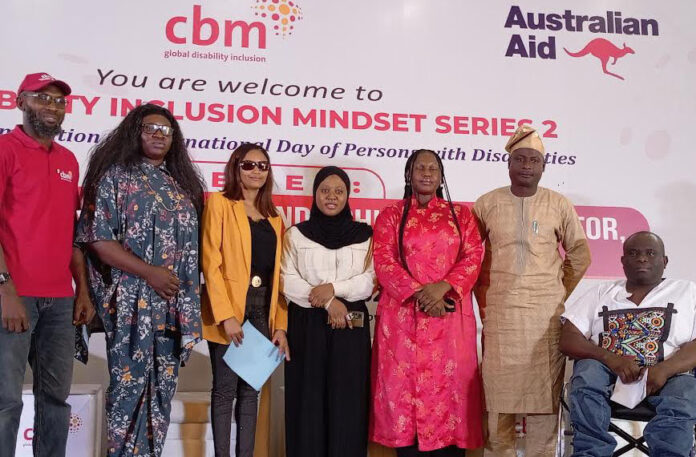The CBM Global Disability Inclusion (CBM Global), on Friday, emphasized the need for Nigeria to take cognisance of achieving the Sustainable Development Goals (SDGs) for people with disabilities in the country.
Its said that the rights of persons with disabilities are still being overlooked.
The Country Director, CBM Global Disability Inclusion (CBM Global), Ms. Ekaete Umoh, disclosed this in Abuja, at second maiden disability inclusion mindset series, with the theme: ‘United in Action to rescue and achieve the Sustainable Development Goals, with and by persons with disabilities’ to commemorate the International Day of Persons with Disabilities, organized by the CBM Global Disability Inclusion (CBM Global),
She noted that the maiden disability inclusion mindset series, is a funding support from the UK Government and Australian Government.
Quoting a recent United Nations’ report, Ms. Ekaete said, “The UN has revealed that findings from its Disability and Development Report 2023 indicate that the world is grossly off track in meeting several SDGs for persons with disabilities.
“It is recommended that concerted efforts are intensified and accelerated to rescue the SDGs for, with and by persons with disabilities, given that persons with disabilities have historically been marginalized and have often been among those left furthest behind.”
However, she noted that Nigeria has recorded a significant milestone in the enactment of the Disability Act.
According to her, “The policy environment for disability inclusive development in Nigeria has received an efficacious boost with the enactment of the Discrimination Against Persons with Disabilities (Prohibition) Act 2018. Although the provisions of the Act appear satisfactory, not much has been done about its implementation and enforcement.
“Many people, including persons with disabilities, are not aware of the existence of the Act. Perhaps the reason why there is still a general disregard for disability rights in Nigeria.
“Ironically, Section 42 of Nigeria’s Constitution guarantees the fundamental human right of freedom from discrimination on grounds of sex, disabilities, or place of origin. Moreover, in signing and ratifying regional and international protocols and conventions on human rights, Nigeria has made commitments to advance the rights of all persons, including persons with disabilities in the country.
“Notable frameworks specific to advancing disability rights that the country has committed to include the United Nations Convention on the Rights of Persons with Disabilities (CRPD), African Charter on Human and Peoples’ Rights, Universal Declaration of Human Rights, Sustainable Development Goals (SDGs), Sendai Framework for Disaster Risk Reduction, and recently the Discrimination Against Persons with Disabilities Prohibition Act amongst others.
“The Federal Government of Nigeria was one of the countries that signed the Global Disability Summit (GDS) Charter for Change, which encouraged focused implementation of the CRPD. Despite the existing frameworks and law, the rights of persons with disabilities are still being overlooked. Progress towards achieving the national GDS commitments is unsurprisingly slow. This persistent neglect is translating to increased rights abuse and heightened poverty of persons with disabilities.”
In his remarks, the Australian Deputy High Commission to Nigeria, Matthew Mechan, noted they have been supporting Nigeria’s health services and communities project in the northeast and northwest.
He said: “The Australian Government, through our partners CBM Australia, is proud to have supported CBM in Nigeria under the Australian NGO Cooperation Program since 2015,
“This project embodies the Disability Inclusion Mindset as it helps strengthen local health systems to deliver reproductive health, eye health and medication to prevent and treat diseases and conditions that can cause preventable disabilities. This work though is only one aspect of how we support the building of a more inclusive society here in Nigeria.”
Guardian


